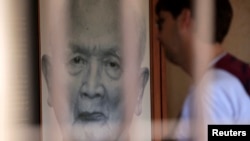The UN-backed Khmer Rouge tribunal is set to issue a verdict in the first phase of a trial against two aging regime leaders on Thursday, in a greatly anticipated moment for survivors of the regime and a major test of the court’s mandate.
Nuon Chea, 87, and Khieu Samphan, 82, are facing atrocities crimes charges, including genocide, for their roles as leaders within the movement. They will begin the second and final phase of their trial, which was broken into phases for expediency, later this year.
Thursday’s verdict will be a landmark moment for the court, which has so far only tried one other Khmer Rouge member. But it could also be a disappointment for victims.
At a meeting in Phnom Penh Wednesday, survivors said they are anxiously awaiting the verdict but are already disappointed the court has not granted them individual compensation. Many would like a small amount of money with which to perform religious ceremonies for those killed by the regime, they said, something the court has not yet granted.
“I want to talk to them and ask them publicly, why haven’t they included our demands for individual compensation?” said Beng Seourn, from Svay Rieng province, who had made an official request for money to the court.
Money was not the only thing some people wanted, however. Neang Sokhorn, a survivor from Preah Sihanouk province, said she wanted issued a special ID card that would allow her free medical care.
The tribunal was established in 2006, with a mandate to try leaders of the Khmer Rouge for atrocities and to bring about national reconciliation and possible remediation for survivors. More than 1.7 million died in less than four years under the Khmer Rouge, from overwork, starvation, or execution, leaving major psychic scars on the nation. Thursday’s verdict will have to address those scars.
Nou Leakhena, a sociologist who has helped some 170 complainants from the US, says time is running out for many survivors, who are as old as the men on trial.
“Time is almost running out,” she told VOA Khmer in an interview. “I’m worried that they might die before the tribunal finishes its work, because their health is much weaker and they still have received no verdict.”
Not only that, but they could be disappointed in the outcome. Many were angered at the tribunal’s first verdict, for the torture chief known as Comrade Duch, who first received a commuted sentence of 19 years for his role a supervisor of a major Khmer Rouge detention center and was later given a life sentence, after an appeal from prosecutors.
Nou Leakhena conducted a pre-verdict session last month for those she has been working with, to prepare them for the worst. “In fact, they don’t trust the tribunal 100 percent,” she said. “They have already prepared themselves mentally. We just want them to be prepared more, in case there is no guilty verdict, so that they don’t feel disappointed.”
Henry Chhorn, a survivor whose wife’s relatives were killed by the Khmer Rouge because of his military service, said he was seeking the “truth” about the regime from the tribunal process.
“I have to find justice for those who died,” he said.
Survivors like Henry Chhorn and others will be watching closely as the verdict is read at the court outside Phnom Penh on Thursday.
For those who cannot go to the court, the Documentation Center of Cambodia will host numerous live broadcasts of the tribunal verdict at 20 sites across 12 provinces, in pagodas, district offices and other public spaces.
“The screening will allow all audiences to watch the live verdict pronouncement,” said Ly Sok Kheang, who heads the center’s justice project. “After watching, we will open forums for discussion to allow them to express their ideas about the verdict and heal their traumatic pasts. If they are not satisfied, whatever else they want, we will listen deeply to them. Being a good listener is important to allow them relief from their suffering.”
On Eve of Khmer Rouge Verdict, Survivors on Edge
- Suy Heimkhemra
- Khoun Theara
- VOA Khmer

PHNOM PENH —








